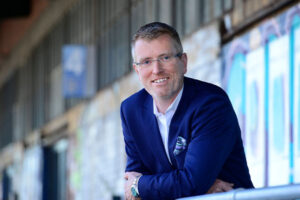On January 1, 2021, ECE is due to reposition itself as an integrated group in the real estate and investment group, offering asset management, project development expertise, investment management, and other full-service real estate services under one roof. The new ECE Group, which will be led by Alexander Otto as CEO and Claudia Plath as CFO, will be responsible for the strategy and steering of the entire group. The Marketplaces (shopping centers) and Work & Live (residential, hotel, logistics, office) market segments will form independent companies in the future. A third company will be ECE Real Estate Partners, an investment company. Its structure as an independent, regulated Alternative Investment Fund Manager (AIFM), with activities in Hamburg and a subsidiary in Luxembourg, will remain unchanged.
ACROSS: ECE will soon be known as the ECE Group. What were the driving factors behind the restructuring decision?
JOANNA FISHER: Our objective is to clearly show the market what ECE’s strengths are and to underpin that ECE is a real estate company that provides exceptional expertise in all available asset classes within the real estate industry. These are strengths that have been developed over a number of years. The set-up of independent group companies for the market areas shopping (note: “Marketplaces”) and residential, hotel, logistics, and office real estate (note: “Work & Live”) will ultimately result in the most suitable experts being responsible for the respective asset class. The aim is to become even stronger in providing the specialized services to our customers and to respond to their needs and the market requirements even more quickly. Needless to say, there is a good amount of interaction between the teams. At ECE Marketplaces, we will put our focus fully on the shopping center business to perfectly meet the demands of the market and our customers.
ACROSS: Up to now, ECE has primarily focused on retail and retail real estate. Will that change to a large extent as a result of the restructuring?
FISHER: The shopping segment within ECE has been extremely well positioned and will remain to do so. Retail Real Estate will continue to be one of the main activities of ECE, and our shopping business will even be strengthened through the new structure. What has been changing, is our focus in that area: In the future, there will be a strong management orientation to further develop the assets for the investors and to ensure that the value of the assets is maintained. At the same time, many people primarily associate ECE with “shopping”. However, we have been involved in a wide range of asset classes for quite some time. For example, ECE has succeeded in becoming the third largest German hotel developer. Other asset classes have also been strongly represented within the Group with many projects in the residential, logistics, and office real estate. At present, the development potential is particularly high in areas beyond the retail sector. The focal point of each asset class is in a state of change. That is definitely something that we have taken into account.
ACROSS: You will be the head of ECE Marketplaces in the future. How do you define marketplaces, and what business areas, services, and other activities are covered by that segment?
FISHER: Marketplaces are places in which all activities related to shopping are linked together. In that sense, shopping centers are living and dynamic marketplaces and our mission is to bring such places to life and to find, provide, and to position the content and services that our customers demand. That is the essence of marketplaces. Our overriding objective is to be the best shopping center manager in the market. It is all-encompassing and includes not only asset management, leasing, and on-site center management, but also communication with consumers and addressing new challenges, such as digitalization. Of course, mobility, parking, sustainability, and energy management for the highly complex building structures of shopping centers are also essential. And at ECE Marketplaces, everything is offered from a single source.
ACROSS: Are any new projects under development in the marketplaces segment?
FISHER: We do not see much potential for new ground-up developments. At ECE Marketplaces, however, we are involved in large-scale refurbishments and we are still interested in new management takeovers and the acquisition of shopping centers. Our focus is on professional management, on the redevelopment and on the continuous change of shopping centers to keep them relevant and up to date.
ACROSS: Covid-19 has brought about a number of changes. 2020 has been a difficult year. What lessons have you learned from the current ordeal?
FISHER: First and foremost, we have learned to remain calm and to act quickly in a crisis like this. Given our size – we have 200 centers in 12 countries under management – this has not been an easy task, but we have been both cool-headed and fast in our reaction. We have also seen how important partnership-based communication is. Both investors and retailers had to make a strong effort to work more closely together and to meet the challenges during the crisis. For sure, not everything worked perfectly well from the beginning, but we have managed to establish a continuous communication, and in the end, fortunately, we received fairly good feedback from the market.
Covid-19 has also clearly shown the differences in location quality. Areas in which problems existed prior to the coronavirus outbreak are now facing much greater challenges and may continue to do so. Of course, even good locations, such as city centers, are suffering due to the crisis. Both the coronavirus as well as the increase in the number of people working from home has led to a shortage of visitors from business offices. However, these good locations will recover and continue to be attractive in the long run. Digitalization has also been dramatically accelerated as a result of the Covid-19 pandemic and made it very clear: As a retailer today, you have to be broadly positioned in order to reach your customers.
ACROSS: Consolidation, digitalization, and repositioning are the current challenges facing the industry. In recent months, online retail figures have risen dramatically, although this was partly due to the lockdown. How should you position yourself as a brick-and-mortar retailer?
FISHER: In my opinion, online versus offline ceased being about competition a long time ago, and now the issue revolves more around working together and connecting the channels. Nowadays, it is essential for retailers to integrate the online issue into their business processes. Two years ago, we started to set up our “Digital Mall”, and we have seen an enormous increase in interest in that area. Essentially, the “Digital Mall” functions as a digital shop window, but we are continuously moving towards an omnichannel platform and have increasingly tested the areas of digital transactions and delivery at Hamburg’s Alstertal-Einkaufszentrum AEZ shopping center and have started to connect our “Digital Mall” to other platforms such as Otto and Google. Our ultimate goal is to provide several ways for our retailers to reach their customers.
ACROSS: Over the last few months, retailers have suffered greatly as a result of the crisis. How challenging will it be to attract new retail partners or shop concepts in the future? As we all know, marketplaces survive on the innovative concepts that cannot be found on every street corner.
FISHER: Exactly. No one can say that new, contemporary concepts grow on trees, and all you have to do is pick them. The current situation in leasing shops is extremely challenging. The number of retailers who are expanding is low, and the market is busy consolidating. Cross-border acquisition is also rather difficult at the moment.
As a result, we are currently mainly focused on securing the existing shop portfolio. Nevertheless, we are forward-looking and have still managed to introduce additional creative measures and have come up with a number of new ideas. You really have to keep an eye on how trends and customer demands develop. In recent months, for example, we have seen a veritable run on sports suppliers, especially those specializing in outdoor sports. In Germany, bicycles and e-bikes were sold out for weeks because of Covid-19. Such opportunities must be seized and integrated into marketplaces, both digital and brick-and-mortar.
ACROSS: Looking back, your career at ECE has been quite remarkable. What have some of your most exciting moments been, and what are your plans for the future?
FISHER: All in all, I have been working with ECE for 22 years now, quite a long time. After graduation, I started working at ECE as a trainee center manager. ECE was in the process of internationalization. Due to the fact that I was born in Poland and had an international background, I was of particular interest to the company. Experiencing the expansion first-hand was extremely exciting. ECE developed a number of centers following the opening of the East. As a result, I was able to gain a lot of experience in the German and international markets – both in the retail and real estate sectors. I was not exclusively focused on center management, but rather on a very broad interdisciplinary approach. The crisis of 2009/2010 was particularly memorable. I spent a great deal of time working in Eastern Europe during that period. That was a pivotal point in my professional life and those experiences have helped me a lot in managing the current crisis. In 2014, I was given the opportunity to take over the center management as the managing director. At that time, digitalization was beginning to take hold in the shopping center industry. I think I was able to generate great impetus in that regard. Now that I am about to become the CEO of ECE Marketplaces, I am particularly pleased that I can take a more comprehensive role with respect to setting up and creating things with a broad perspective. in a particular business segment. Plus: I love shopping, and I really enjoy my job.
ACROSS: CEO positions in the business world, particularly in Europe, are heavily dominated by men. How does it feel to be a female CEO in such an environment?
FISHER: In the past, women who chose careers in the real estate industry always had to cope with working in a male-dominated environment. Thankfully, a lot has changed in recent years. More and more women are active in high-level, decision-making positions. Therefore, I do not feel on my own at all. I am a very strong advocate of diversity. I have observed that mixed teams are more successful teams as they come up with various aspects and points of view. In principle, I naturally welcome the fact that there are more and more women in management positions, and I am happy that ECE is committed to ensuring observance of equal rights. In the new structure, for example, my colleague Claudia Plath was appointed CFO of the ECE Group.






